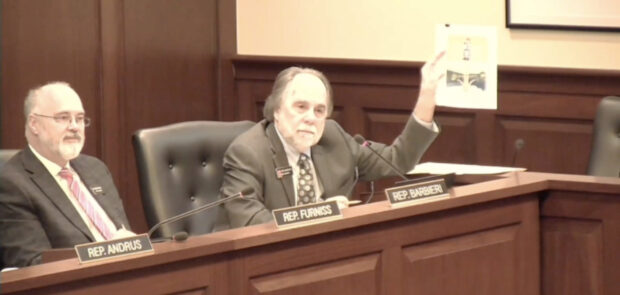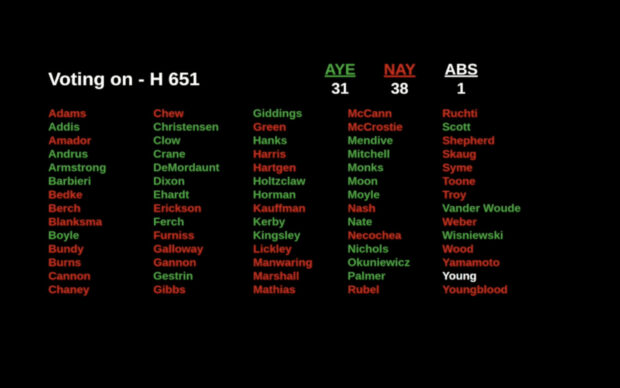The House State Affairs Committee passed a bill on party lines that would make it illegal for employees of schools, libraries and other organizations to disseminate “material harmful to minors.”
Library employees testified that House Bill 666 criminalizes librarians, opening them up to prosecution and penalties for book stocking decisions they may not have made. Parents urged HB 666’s passing to prevent their children from reading about LGBTQ experiences or checking out sexually graphic texts.
“I believe that children are being targeted by those who desire to normalize sexual anarchy, specifically because children can’t filter information the same as adults,” said Rochelle Audison.
Librarian Erin Kennedy said the bill’s ban on giving children “harmful materials” is “extremely vague.”
“Does that mean only pornographic materials — materials with sexual content? Or does it mean materials about violence, guns, materials about mental health conditions? We walk down the slippery slope of censorship of constitutionally-protected speech when we have a bill like this,” Kennedy said.
Committee members reviewed library books with pages they considered sexually inappropriate.
“I’m absolutely appalled. I feel dirty. I got about two pages in and that was it for me,” said Rep. James Holtzclaw, R-Meridian.

A group of parents complained that their children have access to books about gay and transgender people’s experiences.
Kara Claridge said her daughter read a picture book depicting a prince and a knight’s romance and complained of library books about drag queens.
“My daughter’s innocence was violated,” Claridge said. “I encourage you today to stop the flow of sexually explicit and LGBTQ books to minors.”
Michael Hahn complained of library books that describe sexual contact between boys and about people realizing they’re transgender.
“We’re starting to program our kids at a really early age. You know, this movement is already coopted Hollywood. It’s already coopted the media. And now, they’re coopting schools and they’re coopting libraries,” Hahn said.
Librarians dismissed multiple concerns that pornography is allowed or present in libraries.
“Not even for adults. Sorry,” library branch director Huda Shaltry said with a laugh.
Library workers said the sexually explicit content reviewed by lawmakers is kept in adult book sections and pointed out that the bill wouldn’t cause any of those books to be taken out of libraries. It would only make library staff or boards — the bill doesn’t clarify which — liable if a child checks out an explicit book.
In closing, sponsor Rep. Gayann DeMordaunt said because the bill would simply remove an exemption from existing law that shields library and school workers from prosecution, “this idea of criminalizing librarians is patently false, absolutely, patently false.”
“While likely this is inadvertent, the increasingly frequent exposure of our children to obscene pornographic materials in places that I, as a parent, assume are safe and free from these kinds of harmful materials is downright alarming,” DeMordaunt, R-Eagle, said.
The committee’s two Democrats — Boise Reps. John Gannon and Holli Woodings, a Boise City Council member filling in for Chris Mathias — voted against the bill on a 12-2 vote.
House sinks drug testing for subs bill
The House narrowly killed a bill that would have required school districts to drug test substitute teachers before employing them.
Substitutes already must undergo pre-employment background checks and fingerprinting that should catch drug-related convictions on prospective subs’ records, though Inkom Republican Rep. Randy Armstrong erroneously made a claim to the contrary when debating for the bill Thursday.
House Bill 651 would newly mandate drug tests and would increase the frequency of mandatory background checks from every five years to every two. A 31-38 vote killed it, as lawmakers raised concerns about creating an onerous mandate for school districts that fails to effectively address drug trafficking.

“I’m speaking on behalf of the two school districts in my district, who see this as just another enormous burden in their attempt to get substitutes in their schools,” said Rep. Gary Marshall, R-Idaho Falls.
School district reps testified at a committee hearing that it would be costly to meet state drug testing requirements and pointed out that the bill doesn’t determine whether subs or districts would be forced to foot the bill.
Rep. Judy Boyle, R-Midvale, brought HB 651, raising concerns about drug trafficking, particularly of fentanyl, into Idaho. And she said the low requirements for subbing in Idaho make it easy for people using and selling drugs to sub.
“This provides a horrid opportunity for people who want to either solicit drugs to our children or are on drugs themselves,” Boyle said.
In committee, experts said they weren’t aware of any cases in which substitute teachers have been caught selling drugs to Idaho students, as Boyle warned. And school district reps said they already test substitute teachers and permanent employees if their behavior is suspicious.
Currently, districts have the option of drug testing staff at will. They aren’t required to drug test any employees.
Scholarship eligibility. The House also passed another bill, expanding eligibility for a state scholarship to students who earn matching scholarships from private businesses. House Bill 685, which passed unanimously, is the Legislature’s second attempt to expand eligibility to students whose matching scholarships didn’t have a GPA requirement. The first bid was sidetracked over nepotism concerns.
WWAMI proposals head to House floor
The House should vote in the next few days on a pair of proposals regarding WWAMI: a cooperative that provides medical school seats for students from Washington, Wyoming, Idaho, Montana and Alaska.
House Bill 718 would require Idaho students in the WWAMI medical school program to practice medicine in the state for at least four years. If the students don’t meet the contract terms, they would have to pay the state back for its costs.
Idaho is spending about $6.9 million on WWAMI this year.
The bill’s sponsor, House Majority Leader Mike Moyle, R-Star, said the bill is an attempt to address Idaho’s doctor shortage; the state ranks No. 49 in the nation in physicians per capita. About half of Idaho’s WWAMI graduates return to Idaho after studying at the University of Washington’s medical school.
Moyle said his bill is modeled after similar legislation in Wyoming, Alaska and Montana.
The House Education Committee endorsed the bill, over some objections. Rep. Gary Marshall, R-Idaho Falls, said the bill could penalize Idaho students who want to return to Idaho, but can’t find a residency or a place to practice in a specialized field.
“Forcing them to repay money if they can’t come back is the wrong thing to do,” he said.
House Education also endorsed Moyle’s nonbinding House Concurrent Resolution 38, which urges the State Board of Education to add to Idaho’s 40 WWAMI seats, if space becomes available.
Both proposals now go to the House floor.
Dyslexia, masks and questionnaires: New bills surface in House Education
Working its way through a busy agenda Thursday, House Education quickly introduced several new bills, some on familiar topics.
Dyslexia. The new bill is designed to beef up Senate Bill 1280, which is designed to set up screening and teacher training programs to address dyslexia. The rewrite also calls for the creation of a state dyslexia handbook for teachers. SB 1280 passed the Senate unanimously, but House Education has not discussed it, or a competing bill from state superintendent Sherri Ybarra. The committee could take up the issue as early as Friday, committee Chairman Lance Clow said.
Masks in schools. A new bill would allow parents or students to opt out of wearing masks in school, “for medical, religious or personal belief reasons.” The House passed a similar opt-out bill when lawmakers reconvened in November, but the Senate did not act on it.
Questionnaires. Another bill would require school boards to approve any nonacademic evaluations, surveys, questionnaires or data collection — and allow parents to opt their children out of any such programs.
Idaho Education News reporter Kevin Richert contributed to this report.
